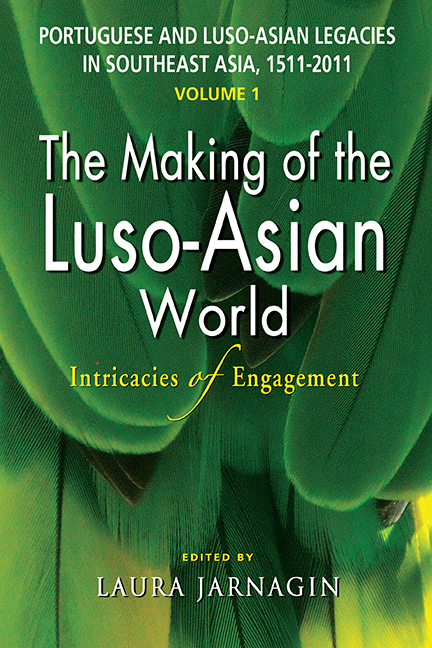 Portuguese and Luso-Asian Legacies in Southeast Asia, 1511–2011, vol. 1
Portuguese and Luso-Asian Legacies in Southeast Asia, 1511–2011, vol. 1 Book contents
- Frontmatter
- Contents
- List of Charts, Figures and Tables
- A Tribute to Glenn Ames
- Preface
- List of Contributors
- Glossary
- Introduction: Towards Clarity through Complexity
- Part One Adaptations and Transitions in the South and Southeast Asian Theatres, Sixteenth through Eighteenth Centuries
- Part Two Dispersion, Mobility and Demography from the Sixteenth into the Twenty-first Centuries
- Part Three Mixed Legacies: The Portuguese and Luso-Asians in the Twentieth and Twenty-first Centuries
- 9 Portuguese Communities in East and Southeast Asia during the Japanese Occupation
- 10 Indo-Portuguese Literature and the Goa of Its Writers
- 11 Binding Ties of Miscegenation and Identity: The Narratives of Henrique Senna Fernandes (Macao) and Rex Shelley (Singapore)
- 12 Portuguese Past, Still Imperfect: Revisiting Asia in Luso-Diasporic Writing
- Bibliography
- Index
9 - Portuguese Communities in East and Southeast Asia during the Japanese Occupation
from Part Three - Mixed Legacies: The Portuguese and Luso-Asians in the Twentieth and Twenty-first Centuries
Published online by Cambridge University Press: 21 October 2015
- Frontmatter
- Contents
- List of Charts, Figures and Tables
- A Tribute to Glenn Ames
- Preface
- List of Contributors
- Glossary
- Introduction: Towards Clarity through Complexity
- Part One Adaptations and Transitions in the South and Southeast Asian Theatres, Sixteenth through Eighteenth Centuries
- Part Two Dispersion, Mobility and Demography from the Sixteenth into the Twenty-first Centuries
- Part Three Mixed Legacies: The Portuguese and Luso-Asians in the Twentieth and Twenty-first Centuries
- 9 Portuguese Communities in East and Southeast Asia during the Japanese Occupation
- 10 Indo-Portuguese Literature and the Goa of Its Writers
- 11 Binding Ties of Miscegenation and Identity: The Narratives of Henrique Senna Fernandes (Macao) and Rex Shelley (Singapore)
- 12 Portuguese Past, Still Imperfect: Revisiting Asia in Luso-Diasporic Writing
- Bibliography
- Index
Summary
During the early twentieth century, Portuguese communities formed a prominent element of the social fabric of colonial Hong Kong and Malaya, being one of the largest locally domiciled Eurasian groupings in these territories. Since the late 1940s, however, these communities have gradually declined in number: although a small Portuguese settlement continues to exist in Malacca, the Hong Kong Portuguese community has been almost forgotten today. From the historian's perspective this raises the question, did any specific watershed occur in the twentieth-century evolution of these Portuguese communities? Is it possible to identify a critical moment at which the positions of these communities were irretrievably changed? The twentieth-century development of Portuguese communities in East and Southeast Asia has been explored by only a limited number of studies, and even fewer works have focused on the period of Japanese occupation as a significant epoch in their evolution. In reality, if we hope to unravel the multilayered history of the Portuguese in these regions, their experiences during this tumultuous period merit serious attention. With this aim in mind, this chapter will investigate the compelling wartime experiences of the Portuguese in Japanese-occupied British Asia, with especial focus on colonial Hong Kong and Macao. It will also draw upon the intriguing experiences of Portuguese communities in occupied Malaya and Singapore as supplementary case studies.
The wartime experiences of the Portuguese in British Asia were indeed vastly different from those of any other colonial community during these turbulent years. After these territories were wrenched from British hands by February 1942, most European civilians were herded by the conquering forces into internment camps. Numerous civilians of Portuguese background, however, were not incarcerated by the Japanese. Due to their associations with neutral Portugal, many of them were in fact granted “third national” status and permitted to remain free in the occupied cities. Severe wartime pressures nevertheless compelled hundreds of these civilians to flee to Macao, a tiny colonial outpost of Portugal which was permitted by the Japanese to retain its neutral status. Others were involved in a variety of Allied resistance efforts and clandestine networks during this period. The Japanese conquest of British Asia, for the turmoil and anguish it inflicted, had a critical effect on Portuguese communities despite their neutral position in the region. As this chapter will demonstrate, the Japanese left behind communities that were traumatized, dislocated — and irreversibly altered.
- Type
- Chapter
- Information
- Portuguese and Luso-Asian Legacies in Southeast Asia, 1511–2011, vol. 1The Making of the Luso-Asian World: Intricacies of Engagement, pp. 205 - 228Publisher: ISEAS–Yusof Ishak InstitutePrint publication year: 2011


